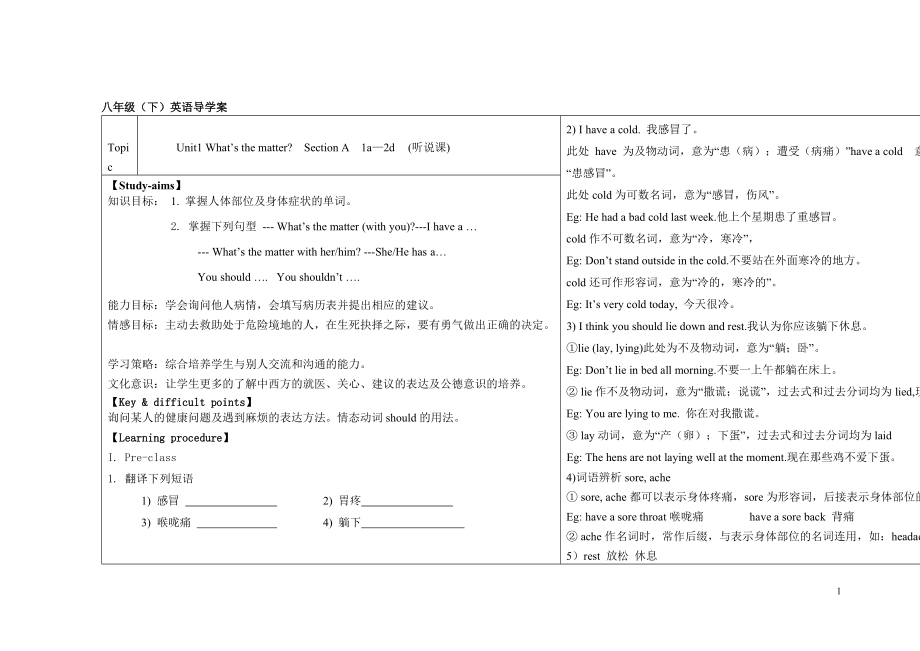《【備課參考】2014年新版人教版八年級(jí)英語(yǔ)下冊(cè)《Unit1what'sthematter》導(dǎo)學(xué)案(第1課時(shí))》由會(huì)員分享�,可在線閱讀,更多相關(guān)《【備課參考】2014年新版人教版八年級(jí)英語(yǔ)下冊(cè)《Unit1what'sthematter》導(dǎo)學(xué)案(第1課時(shí))(4頁(yè)珍藏版)》請(qǐng)?jiān)谘b配圖網(wǎng)上搜索����。
1����、八年級(jí)(下)英語(yǔ)導(dǎo)學(xué)案
Topic
Unit1 What’s the matter? Section A 1a—2d (聽(tīng)說(shuō)課)
2) I have a cold. 我感冒了�。
此處 have 為及物動(dòng)詞,意為“患(?��。?���;遭受(病痛)”have a cold 意為
“患感冒”�。
此處cold為可數(shù)名詞,意為“感冒���,傷風(fēng)”���。
Eg: He had a bad cold last week.他上個(gè)星期患了重感冒。
cold作不可數(shù)名詞�����,意為“冷��,寒冷”,
Eg: Don’t stand outside in the cold.不要站
2�����、在外面寒冷的地方����。
cold還可作形容詞,意為“冷的�,寒冷的”���。
Eg: It’s very cold today, 今天很冷�����。
3) I think you should lie down and rest.我認(rèn)為你應(yīng)該躺下休息�����。
①lie (lay, lying)此處為不及物動(dòng)詞����,意為“躺�;臥”。
Eg: Don’t lie in bed all morning.不要一上午都躺在床上。
② lie作不及物動(dòng)詞���,意為“撒謊��;說(shuō)謊”�����,過(guò)去式和過(guò)去分詞均為lied,現(xiàn)在分詞為lying.
Eg: You are lying to me. 你在對(duì)我撒謊�。
③ lay動(dòng)詞�,意為“產(chǎn)(
3、卵)�;下蛋”,過(guò)去式和過(guò)去分詞均為laid
Eg: The hens are not laying well at the moment.現(xiàn)在那些雞不愛(ài)下蛋���。
4)詞語(yǔ)辨析sore, ache
① sore, ache都可以表示身體疼痛���,sore為形容詞,后接表示身體部位的名詞�����。
Eg: have a sore throat喉嚨痛 have a sore back 背痛
② ache作名詞時(shí)����,常作后綴�,與表示身體部位的名詞連用����,如:headache
5)rest 放松 休息
① 動(dòng)詞 放松 休息
Eg: You should rest for a few days
4、.
② 名詞等于break
have/take a rest=have /take a break
6)復(fù)習(xí)advice need和enough的用法
5. 復(fù)習(xí)提問(wèn)關(guān)于身體部位的名詞
II. While-class
1. 導(dǎo)入新課
【Study-aims】
知識(shí)目標(biāo): 1. 掌握人體部位及身體癥狀的單詞��。
2. 掌握下列句型 --- What’s the matter (with you)?---I have a …
--- What’s the matter with her/him? ---She/He has a…
You should ….?? You
5��、 shouldn’t ….
能力目標(biāo):學(xué)會(huì)詢問(wèn)他人病情��,會(huì)填寫(xiě)病歷表并提出相應(yīng)的建議����。
情感目標(biāo):主動(dòng)去救助處于危險(xiǎn)境地的人�����,在生死抉擇之際����,要有勇氣做出正確的決定。
學(xué)習(xí)策略:綜合培養(yǎng)學(xué)生與別人交流和溝通的能力��。
文化意識(shí):讓學(xué)生更多的了解中西方的就醫(yī)、關(guān)心��、建議的表達(dá)及公德意識(shí)的培養(yǎng)���。
【Key & difficult points】
詢問(wèn)某人的健康問(wèn)題及遇到麻煩的表達(dá)方法��。情態(tài)動(dòng)詞should的用法��。
【Learning procedure】
I. Pre-class
1. 翻譯下列短語(yǔ)
1) 感冒 2) 胃疼
6��、
3) 喉嚨痛 4) 躺下
5) 加有蜂蜜的熱茶 6) 頭疼
7) 量體溫 8) 躺下休息
9) 看牙醫(yī) 10)做一個(gè)X光檢查
11) 割傷自己 12) 發(fā)燒
13) 整個(gè)周末
7��、 14)去看醫(yī)生
2. 知識(shí)超市:
1) matter為可數(shù)名詞���,意為“毛病�����;麻煩事”�����,通常用于句型What’s the matter (with sb)?中�。該問(wèn)句常用來(lái)詢問(wèn)某人患了何種疾病或遇到了何種麻煩����。
Eg: ——What’s the matter with him? 他怎么了��?
——He has a headache. 他頭痛�。
matter還可作不及物動(dòng)詞,意為“要緊�����;有關(guān)系”
Eg: It doesn’t matter. 沒(méi)有關(guān)系
2. Learning the new knowledge
(1)學(xué)會(huì)談?wù)撛儐?wèn)某人的健康問(wèn)題及遇
8�、到麻煩的表達(dá)方法。
(活動(dòng): Work in pairs)
(2)利用多媒體舉一反三���,引出What’s the matter with him/her,并提出自己的建議���。
(活動(dòng):Work in groups)
(3) 聽(tīng)錄音��,完成1b�����、2a和2b.
(4)分角色表演2d并背誦.
3. 當(dāng)堂檢測(cè):
1) 根據(jù)句意及首字母提示完成單詞����。
①. ---- What’s the m with Jenny?
---- She has a cough and a headache.
②.He’s very tired. He s
9���、lie down and rest.
③.I can’t sleep well all the time. Can you give me some a .
④.Most people work until they are 60 or 65 years old. Then they retired(退休) and have a lot of f time.
⑤ My sister has a f . She should be taken to the hospital.
2)根據(jù)漢意完成句子。
① My brother doesn’t f
10���、eel well. He must (休息).
② Little boy, if you (牙疼), you should see a dentist.
③ M y sister has a bad cold and she (高燒).
④ This morning Mary ate something bad. So she (胃疼).
⑤ Jim (喉嚨疼), so he must drink water a
11�、nd must have a good rest.
4. 小結(jié):
III. Post-class
1. 編一個(gè)詢問(wèn)病情并給出建議的對(duì)話�����。
2. 收獲與反思����。
【Blackboard Design】
Unit1 What’s the matter?
What’s the matter?? sore
I have a cold / headache / toothache ache
/ fever /sore throat.
You should/shouldn’t…
My … hurts.
4
 【備課參考】2014年新版人教版八年級(jí)英語(yǔ)下冊(cè)《Unit1what'sthematter》導(dǎo)學(xué)案(第1課時(shí))
【備課參考】2014年新版人教版八年級(jí)英語(yǔ)下冊(cè)《Unit1what'sthematter》導(dǎo)學(xué)案(第1課時(shí))

